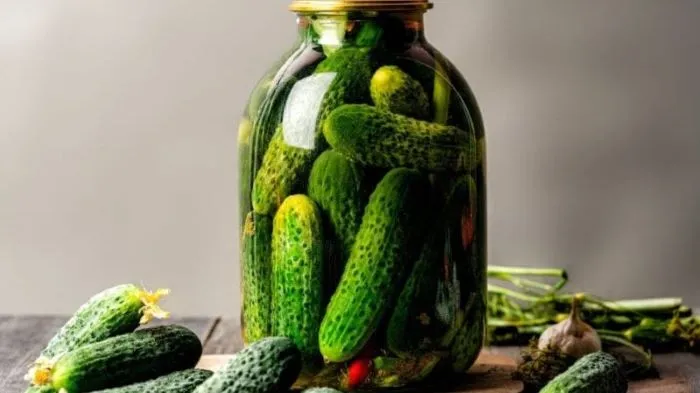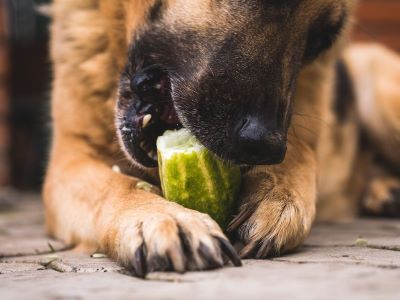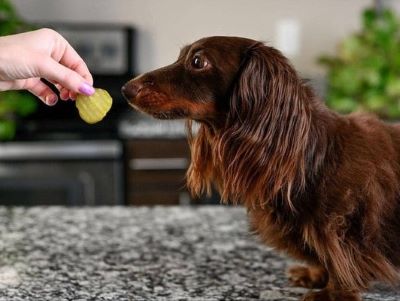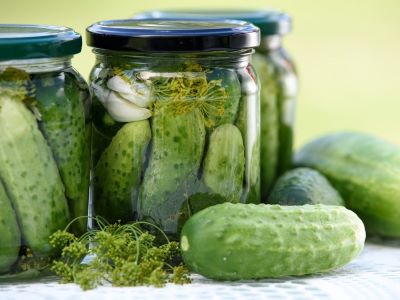Paw parents are always in search of ingredients, fruits, and veggies that can provide their fur baby good taste and good health. This search raises certain doubts and might stress you too, as not all the ingredients are dog-friendly. Gherkins is one such item which you might want to introduce to your dog’s diet due to its nutritional benefits. But wait Can Dogs Eat Gherkins?
In this article, we will dive into the food world of dogs and find out about gherkins and dog combinations. Precautions to feed them, so grab your curiosity as we explore the canine cravings.

Can Dogs Eat Gherkins?
Yes, dogs can eat gherkins. Gherkins are not toxic to dogs, so if your dog just picks up one from the floor he will be fine.
Gherkins is a small variety of cucumber that is used in pickles, it contains vitamins and minerals and also added digestive benefits of probiotics from the fermentation process.
Some dogs will like them, some will get the lick and spit it out. If your dog doesn’t spit out then they will eat a surprising amount of sugar and salt in their treats.
“However, gherkins contain a huge amount of sodium thanks to the brine, so they are not the healthiest option for your dog to snack on. ‘If a dog eats an excess amount of gherkins, it can lead to high blood pressure or heart disease,’ confirms the experts at PetMD“

Gherkins with a combination of onion, garlic, spicy peppers, nutmeg, and sweet variants are not good for dogs. Overall, it’s best to keep your dog away from all pickles, whether they are sweet or sour.
If you’re ever unsure about what’s in a food, it’s always safest to avoid feeding it to your dog. Instead, Feed them plain and raw gherkin.
Though dogs are thought to be safe around geherkins, what about tomatoes? Can Dogs have Tomatoes?
Precautions for Feeding Gherkins
Many times some accidents happen, mostly due to the curiosity of our canine companions. Here are some tips to prevent these mishaps:
- Out of reach: The most important step is, Keep the gherkins out of reach. Store on higher shelves or in locked cabinets. By creating this barrier, you will surely prevent any encounter.
- Intentional feeding: High sodium content leads to potential acidity or stomach upset. The best idea is to avoid or feed them in moderation, it’s best to stick to a balanced diet for your dog.

- Gherkin labels: Before feeding them together with you, make sure you have read the labels where they mention the ingredients, additives or seasonings. Opt for plain, unseasoned options if you are set on letting your dog indulge in gherkin goodness.
- Monitor: After feeding them gherkin look out for any sign of distress. Symptoms may include vomiting, diarrhoea, or tummy troubles. If they do then, rush to the vet.
You may want to think about other possibilities, such as lemons, for your furry friend. Ask your veterinarian can dogs eat lemons before you feed them, though.
Consult With the Vet
When in doubt, reach out to the pros. If your dog shows bad or persistent symptoms and if they have any existing medical condition then do not hesitate to reach out to the vet.
The vet will provide you with expert advice according to your dog’s specific situation. They may also suggest a balanced diet for your dog to ensure nutritional needs[1] are fulfilled regularly.
Alternatives of Gherkins
Although gherkins are safe, it is best to consider some alternative of gherkins for our furry friends. Here are some of them:
- Cucumber: Simple and healthy cucumber slices. Low in calories and high in hydration, they are a great treat option.
- Carrot: Crunchy carrot sticks packed with vitamins are favourite among many dogs. They are satisfying to chew while providing many nutritional benefits.

- Apple: Remove the seeds and core, and your dog can enjoy the natural sweetness and fibre of apple slices. Just remember to feed them in moderation.
- Pumpkin: Cooked, plain pumpkin is a gentle and nutritious option for dogs. It can aid in digestion and offer a different texture for them to enjoy.
- Zucchini: Like cucumber, zucchinis are mild and low in calories. Sliced or diced zucchini can be a delightful alternative snack.
- Blueberries: That little burst of flavour in a dog’s mouth are rich in antioxidants and safe for most dogs. They make sweet and healthy occasional treats.
- Watermelon: During hot days, watermelon can be a hydrating and tasty option for dogs. Just remember to remove the seeds and cut them into chunks.
- Rice Cakes: A low-calorie option for dogs to enjoy a bit of crunch. Makes sure they are plain and free from any flavourings.
- Sweet Potato: They are packed with nutritional. Rich in vitamins and minerals. Serve them in small portions, you can add some veggies too.
- Lean Meat: Plain, cooked chicken, turkey, or lean beef can be a protein-packed treat. Avoid any seasoning or bones.
Remember, alternatives are normally safe but moderation is the key! Always consult with your vet before introducing any new food to your dog’s diet, especially if they have specific health conditions.
FAQs
Can Dogs Eat Cucumbers?
Cucumbers are completely safe for dogs to eat, without needing to peel them. Cucumber is an ideal dog-friendly snack as it contains a variety of important vitamins and minerals as well as being low in calories.
Can Dogs Eat Pickle Juice?
Pickle juice is not safe for your dog. Not only does it contain some potentially toxic ingredients, but it’s also extremely high in salt and could easily lead to salt poisoning. If your dog somehow drank a jar of pickle juice, contact your veterinarian immediately.
Can Dogs Eat Tomatoes?
Dogs can eat tomatoes in moderation, but only ripe ones. Don’t offer your dog tomatoes in large quantities or frequently and make sure to avoid feeding them green tomatoes as they contain substances that can be harmful to them.
Are Pickles the Same as Gherkins?
A gherkin is a particular kind of pickle, but gherkins and pickles have a few key differences: Size: Gherkins are smaller than typical cucumber pickles because they are made from younger cucumbers. Texture: In comparison to pickles, gherkins have a bumpier texture and are crunchier.
Are Gherkins Just Baby Cucumbers?
A gherkin isn’t simply a cucumber you’d buy in the supermarket that’s been pickled. It’s a specific variety of small cucumber that is purposely used for pickling aka turning into a gherkin. You can pickle a regular cucumber, but it won’t turn out exactly like a gherkin.
Summary
In conclusion, we explored the food world of dogs to find out if Can Dogs Eat Gherkins. While dogs may be curious for dogs but it is safe to feed them in moderation and try different options as well. You can opt for alternatives as well.
Remember, as a responsible dog parent it is our responsibility to provide the right food to our dogs. Making mindful choices is important to ensure the health and happiness of our dogs.
Want to learn more about swede as a treat for dogs? Check out our article “Is Swede Good for dogs” to find out if this root vegetable is suitable for your pup.
Reference:
- Cbcc-Ka, T. T. D. (2023, September 8). Dog Nutrition: Guide to dog food nutrients.



